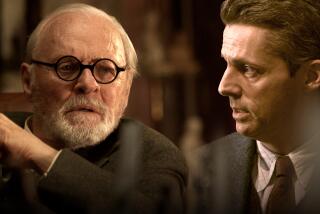Protecting Freud’s Image From Sigmund : FREUD A Life for Our Time<i> by Peter Gay (W.W. Norton: $25; 810 pp., illustrated) </i>
- Share via
In the interest of promulgating his controversial theories, Sigmund Freud saw fit to report and interpret myriad events from his own life, mind and dreams. But he was exceedingly selective when doing so and, later in life, was sharply averse to submitting to a candid biography. Hence, even now, almost half a century after his death--and despite the fact so much is known about the events of his life as a whole--major facets of his mind, character, and personal life remain opaque and subject to much contention. And such matters are critical to any final evaluation of psychoanalysis.
Two attempts have been made at a definitive biography of Freud--by Ernest Jones, with his three-volume study of 1953-57, and by Ronald Clark, with his tome of 1980. Now comes a third such attempt by the distinguished American cultural historian, Peter Gay, in the form of a slick, eloquently written, and elegantly designed volume, which the publisher heralds as comprehensive, trenchant, and “brilliantly argued”--indeed, as the first successful attempt at “unraveling the mind” of Freud in such a way that, at last, the relationship between his life and his work is lucidly laid bare.
In having to rehash a life story by now familiar to so many, professor Gay manages to season it with lots of fascinating new tidbits--mostly with select scraps from hundreds of unpublished letters that he has been the first to gain access to. And these documents allow him to provide the most telling accounts to date of several episodes, some controversial:--for example, Freud’s extended analysis of his daughter, Anna, commencing when she was just 22; his collaboration with William Bullitt on a wild psychoanalytic study intended to denigrate Woodrow Wilson, and his escalating anti-Americanism.
Gay is a graduate of a psychoanalytic institute, yet he supposes himself to be in possession of a “historian’s professional distance” such as spares him from any “idealization” of his subject. And indeed, as if to demonstrate this, he would seem to delight in criticizing Freud for being variously, at times: reckless, aggressive, callous, arrogant, obstinate; in short, for having all manner of human and professional failings. However, such shortcomings, and much of what we here get to learn about the man that is significantly at odds with the received view, and treated by the biographer as isolated or occasional aberrations rather than being cashed out into any radical reappraisal of Freud’s character.
Thus, according to Gay: “His decision to put his daughter Anna on the couch appears like a calculated flouting of the rules he had laid down with such force and precision--for others.” But then, three pages later--the reader by then having learned an awful lot about Freud’s massive over involvement in his daughter’s emotional life toward consolidating a palpably obvious, pathologically intense father-devotion that would ensure her continuing spinsterhood--we are advised: “Most of Freud’s seductive maneuvers (toward Anna) were, no doubt, unconscious.” Which, naturally, leaves the reader wondering if “unconscious” amounts to an interpretation, an apology, or a plain evasion. In any event, Gay’s assertion will hardly convince those more skeptically inclined toward the Freudian canon, who will feel justified in drawing a more sinister conclusion.
So this is a warts-and-all biography; the problem is that it goes only skin-deep. Moreover, Gay’s is hardly the portrait of a man equipped to conceive psychoanalysis, for we are left in the dark as to how Freud’s life and person inspired some of his most basic assumptions. The biographer espouses the orthodox view that Freudian theory was developed primarily in response to phenomena that spontaneously materialized on the couch. However, recent scholarship has shown that it was founded largely on a priori hypotheses inspired by Freud’s reading or subjective preconceptions, while a great deal of its subsequent modifications were profoundly influenced by polemical considerations.
Gay is sharply critical of several of Freud’s major case studies--also several of his other treatises--which represent the cornerstones of psychoanalytic theory and technique. And he is happy even to acknowledge the covert autobiographical inspiration behind so many of these works. But, in overview, he is little concerned with the flimsy foundations on which the doctrine rests and is content to take Freud’s central assumptions as axiomatic.
Symptomatic of this credulity are the 146 pages he apportions to the first 45 years of Freud’s life and work, the period when the basic tenets of psychoanalysis were conceived and laid down, as opposed to the 495 pages he devotes to the last 38 years, when Freud’s principal interest was that of rounding up followers who could be induced to believe as he did. Worse still, Freudian notions are permitted to contaminate the telling of Freud’s early life--little wonder, then, that the hero should ultimately arrive where he has all along been headed.
So, despite the posture, the book is far from being a critical intellectual biography. A 38-page bibliographical essay suggests that Gay is acquainted with much of the scholarship on Freud and psychoanalytic history. But this extensive literature would appear only very seldom to inform his text; when it does, it is inadequately credited; while much of it he dismisses in an almost cavalier fashion--sometimes at this reviewer’s expense.
Here I can allow myself to get personal. Gay considers my own work on Freud to be “speculative.” Well, fair enough, I guess, even if he disdains to elaborate this claim. But to dismiss an essay of mine (entitled “Freud, Fliess, and Fratricide”) while disregarding the simple fact of history--amply documented therein--that Wilhelm Fliess would seriously allege Freud had planned to murder him during their penultimate meeting in 1900 is to ignore a fragment of testimony of unquestionable relevance to any meaningful discussion of the two men’s impassioned relationship. Works of other historians, even the redoubtable Carl Schorske, are given similar short-shrift.
Gay shows himself no better informed on the man Fliess than previous authors. Nevertheless, he confidently advocates the standard view that Freud’s very high esteem of him during his years of increasing isolation, climaxing in his so-called “self-analysis,” constituted a transference-symptom of his own psychoneurosis--here attenuated, though, inasmuch as this is also seen as compensation for the fact that his marriage was intellectually (and, as we are told elsewhere, sexually) so dry, there was little to share with his wife Martha. But then, suddenly, the reader is cursorily apprised of the, relatively speaking, extraordinary fact that, during these lonely years, Freud had one other such confidant and intellectual companion in the person of his wife’s younger sister, Minna Bernays.
Gay tells us that Minna, who moved in with the family in 1896, had intelligence and interest enough to discuss with Freud his gestating theories; she offered him much-needed moral support, and often they traveled alone together on vacation trips. As we are told by one of the Freuds’ maids, Minna was highly possessive and jealous--she would answer the telephone, “Frau Professor Freud.” And, as we know from a variety of published sources, among members of the family’s circle, also among Freud’s pupils, there persisted a rumor of an affair between the two of them. Oscar Rie, once Minna’s physician and one of Freud’s closest friends, is reported having declared: “For children Freud went with Martha; for pleasure he took Minna.”
According to Gay, though, Freud’s “less than reliable” dissident pupil, Carl Jung, was the “first” to have “launched” this “scandalous” story, one that “lacks convincing evidence.” Not, however, that the author cares to properly address the very extensive historico-circumstantial evidence adduced in favor of there having been just such an affair. All this he simply demeans as “confident conjectures” and “clever chains of inferences” offered (by this reviewer) as “demonstrated fact” and, instead, finds it apt to report that, in his 1980 biography, Ronald Clark “has considered the evidence, notably the Jung interview (in which such an affair was alleged), and rejects it as highly improbable.” A more careful reading of Clark’s text would have betrayed, however, that that writer had never actually examined the Jung interview; he preferred simply to dismiss it out of hand.
Fliess and Minna Bernays represent two of the most important relationships of Freud’s adult life--yet we learn precious little of these interactions. But just such a solipsistic viewpoint pervades the biography as a whole, even when it comes to other major figures such as Jung. Moreover, rigorous scholarship is not part of Gay’s agenda, as the author is more concerned with the bold statement, the sweeping assertion, and the summary judgment. As a result, the informed or alert reader cannot help but feel like a demurring tourist cajoled into a budget-tour of Freud’s life and times in the charge of a smug and grandiloquent guide intent on cramming everything into a neat--and forgettable--package.
The book is highly recommended, then, for those who enjoy an easy read and care little whether what they are reading is particularly well-informed or true--in other words, for those who like their food for the mind conveniently processed and prepackaged. It is also recommended for analysts and patients content to take Freud’s doctrine at face-value and disinclined to concern themselves with its shaky historical and logical foundations. Those seriously concerned with Freud history, on the other hand, will value the book for all the scraps of new material it presents until such time as these are published complete in the original; and they will continue to look forward to the day when we shall have a biography of this most complex and bizarre of geniuses that will truly enlighten us as to his person.
More to Read
Sign up for our Book Club newsletter
Get the latest news, events and more from the Los Angeles Times Book Club, and help us get L.A. reading and talking.
You may occasionally receive promotional content from the Los Angeles Times.









